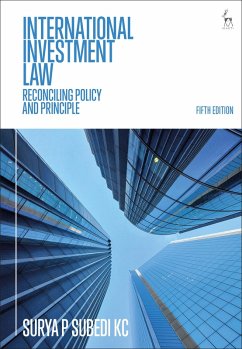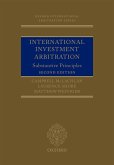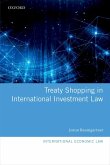34,95 €
34,95 €
inkl. MwSt.
Sofort per Download lieferbar

17 °P sammeln
34,95 €
Als Download kaufen

34,95 €
inkl. MwSt.
Sofort per Download lieferbar

17 °P sammeln
Jetzt verschenken
Alle Infos zum eBook verschenken
34,95 €
inkl. MwSt.
Sofort per Download lieferbar
Alle Infos zum eBook verschenken

17 °P sammeln
- Format: ePub
- Merkliste
- Auf die Merkliste
- Bewerten Bewerten
- Teilen
- Produkt teilen
- Produkterinnerung
- Produkterinnerung

Bitte loggen Sie sich zunächst in Ihr Kundenkonto ein oder registrieren Sie sich bei
bücher.de, um das eBook-Abo tolino select nutzen zu können.
Hier können Sie sich einloggen
Hier können Sie sich einloggen
Sie sind bereits eingeloggt. Klicken Sie auf 2. tolino select Abo, um fortzufahren.

Bitte loggen Sie sich zunächst in Ihr Kundenkonto ein oder registrieren Sie sich bei bücher.de, um das eBook-Abo tolino select nutzen zu können.
'...This book [...] goes beyond stating what the law is and focuses on controversies occurring within this area of the law... an excellent introduction to this complex area of international law for newcomers to the subject' Kate Miles, Australian International Law Journal
The updated edition of this acclaimed book offers a critical overview of the law of foreign investment, incorporating a thorough analysis of the principles and standards of treatment available to foreign investors in international law. It is authoritative and multi-layered, offering an analysis of the key issues and an…mehr
- Geräte: eReader
- mit Kopierschutz
- eBook Hilfe
- Größe: 2.06MB
Andere Kunden interessierten sich auch für
![International Investment Law (eBook, PDF) International Investment Law (eBook, PDF)]() Surya P SubediInternational Investment Law (eBook, PDF)35,95 €
Surya P SubediInternational Investment Law (eBook, PDF)35,95 €![Investment Arbitration and State-Driven Reform (eBook, ePUB) Investment Arbitration and State-Driven Reform (eBook, ePUB)]() Wolfgang AlschnerInvestment Arbitration and State-Driven Reform (eBook, ePUB)59,95 €
Wolfgang AlschnerInvestment Arbitration and State-Driven Reform (eBook, ePUB)59,95 €![State Capitalism and International Investment Law (eBook, ePUB) State Capitalism and International Investment Law (eBook, ePUB)]() State Capitalism and International Investment Law (eBook, ePUB)39,95 €
State Capitalism and International Investment Law (eBook, ePUB)39,95 €![Interpretation of International Investment Treaties (eBook, ePUB) Interpretation of International Investment Treaties (eBook, ePUB)]() Tarcisio GazziniInterpretation of International Investment Treaties (eBook, ePUB)113,95 €
Tarcisio GazziniInterpretation of International Investment Treaties (eBook, ePUB)113,95 €![Human Rights Interdependence in National and International Politics (eBook, ePUB) Human Rights Interdependence in National and International Politics (eBook, ePUB)]() Human Rights Interdependence in National and International Politics (eBook, ePUB)41,95 €
Human Rights Interdependence in National and International Politics (eBook, ePUB)41,95 €![International Investment Arbitration (eBook, ePUB) International Investment Arbitration (eBook, ePUB)]() Campbell McLachlanInternational Investment Arbitration (eBook, ePUB)67,95 €
Campbell McLachlanInternational Investment Arbitration (eBook, ePUB)67,95 €![Treaty Shopping in International Investment Law (eBook, ePUB) Treaty Shopping in International Investment Law (eBook, ePUB)]() Jorun BaumgartnerTreaty Shopping in International Investment Law (eBook, ePUB)81,95 €
Jorun BaumgartnerTreaty Shopping in International Investment Law (eBook, ePUB)81,95 €-
-
-
'...This book [...] goes beyond stating what the law is and focuses on controversies occurring within this area of the law... an excellent introduction to this complex area of international law for newcomers to the subject' Kate Miles, Australian International Law Journal
The updated edition of this acclaimed book offers a critical overview of the law of foreign investment, incorporating a thorough analysis of the principles and standards of treatment available to foreign investors in international law. It is authoritative and multi-layered, offering an analysis of the key issues and an insightful assessment of recent trends in the case law, from both developed and developing country perspectives.
A major feature of the book is that it deals with the tension between the law of foreign investment and other competing principles of international law. In doing so, it proposes ways of achieving a balance between these principles and the need to protect the legitimate rights and expectations of foreign investors on the one hand, and the need not to restrict unduly the right of host governments to implement their public policy on the other, including the protection of the environment and human rights, and the promotion of social and economic justice within the host country.
Many of the pioneering ideas that were advanced in the first edition of this book have been taken up by governments and international organisations in their attempts to reform the investor-State dispute settlement mechanism and strike a balance between different competing principles in developing international investment law. Accordingly, this fifth edition captures the essence of the ongoing multiple reform processes - either planned or envisaged - currently underway.
The updated edition of this acclaimed book offers a critical overview of the law of foreign investment, incorporating a thorough analysis of the principles and standards of treatment available to foreign investors in international law. It is authoritative and multi-layered, offering an analysis of the key issues and an insightful assessment of recent trends in the case law, from both developed and developing country perspectives.
A major feature of the book is that it deals with the tension between the law of foreign investment and other competing principles of international law. In doing so, it proposes ways of achieving a balance between these principles and the need to protect the legitimate rights and expectations of foreign investors on the one hand, and the need not to restrict unduly the right of host governments to implement their public policy on the other, including the protection of the environment and human rights, and the promotion of social and economic justice within the host country.
Many of the pioneering ideas that were advanced in the first edition of this book have been taken up by governments and international organisations in their attempts to reform the investor-State dispute settlement mechanism and strike a balance between different competing principles in developing international investment law. Accordingly, this fifth edition captures the essence of the ongoing multiple reform processes - either planned or envisaged - currently underway.
Produktdetails
- Produktdetails
- Verlag: Bloomsbury UK eBooks
- Seitenzahl: 392
- Erscheinungstermin: 21. März 2024
- Englisch
- ISBN-13: 9781509975181
- Artikelnr.: 70032096
- Verlag: Bloomsbury UK eBooks
- Seitenzahl: 392
- Erscheinungstermin: 21. März 2024
- Englisch
- ISBN-13: 9781509975181
- Artikelnr.: 70032096
- Herstellerkennzeichnung Die Herstellerinformationen sind derzeit nicht verfügbar.
Surya P Subedi KC is Professor of International Law at the University of Leeds, Member of the Institut de Droit International, former UN Special Rapporteur for Human Rights in Cambodia, Visiting Faculty Member on the International Human Rights Law Programme at the University of Oxford, and Practising Barrister at Three Stone Chambers, London, UK.
Introduction 1. International Investment Law in a Changing World
Introduction A New Turn in International Investment Law Reform of the
Investor-State Dispute Settlement Mechanism Public View on the
Investor-State Dispute Settlement Mechanism Changing State Practice The
Investor-State Dispute Settlement Mechanism at a Cross Roads The Impact of
Change in State Practice Attempts to Reconcile Competing Principles The
Inherent Weaknesses of International Investment Law Indications for the
Future Conclusions Suggestions for further reading 2. Evolution of
International Investment Law Introduction The Early Years National
Treatment versus International Minimum Standard The Era of Gunboat
Diplomacy Diplomatic Protection and the Treatment of Aliens in
International Law The Calvo Doctrine The Hull Formula Conclusion
Suggestions for further reading 3. International Efforts to Regulate
Foreign Investment Introduction The Havana Charter of 1948 The UN
Declaration on Permanent Sovereignty Over Natural Resources Attempts to
Develop the Law Through the New International Economic Order The 1974
Charter of Economic Rights and Duties of States The UN Draft Code of
Conduct for Transnational Corporations An Appraisal of the Eff orts Made in
the UN The Role of the World Bank International Convention on the
Settlement of Investment Disputes A 'Silent Revolution' in International
Law? The Multilateral Investment Guarantee Agency The 1992 Guidelines of
the World Bank The WTO Agreements and Foreign Investment The OECD
Guidelines and the Multilateral Agreement on Investment The 2011 OECD
Guidelines The International Labour Organization's Guidelines Other
Voluntary Schemes An Inconclusive End to the Twentieth Century in Foreign
Investment Regulation The Eff orts Made at the Dawn of the Twenty-First
Century The UN Commission and Council on Human Rights Towards a Binding
Instrument on Multinational Enterprises and Human Rights Anti-Corruption
Conventions A New Transparency Convention on Investor-State Investment
Arbitration International Bar Association Guidelines on Conflicts of
Interest Investment Arbitration Resolution of the Institut de Droit
International The World Economic Forum in Davos and Investment Policy The
Shift in Emphasis on the Need for an International Agreement Conclusions
Suggestions for further reading 4. Protection of Foreign Investment in
Customary International Law Introduction Protection under International Law
and Domestic Law The Fundamental Principles of Foreign Investment
Protection The Objectives of the Principles Definition of Investor and
Investment Fair and Equitable Treatment in Customary International Law Full
Protection and Security Most-Favoured-Nation Treatment National Treatment
Protection against Expropriation in Customary International Law The
Standards of Compensation in Customary International Law Access to
International Arbitration Conclusion Suggestions for further reading 5.
Protection of Foreign Investment Through Bilateral Investment Treaties
Introduction The Origins of Bilateral Investment Treaties The Content of
Bilateral Investment Treaties The Significance of Bilateral Investment
Treaties Bilateral Investment Treaties for the Promotion of Foreign
Investment Greater Standard of Protection under Bilateral Investment
Treaties Bilateral Investment Treaties as Insurance against Political Risks
Bilateral Investment Treaties as a Tool for Globalisation, Economic
Liberalisation and Privatisation Mechanism to Expand International
Standards and to Codify the Lex Specialis Effect of Bilateral Investment
Treaty Provisions as Obligations Erga Omnes? Decentralisation of the Law of
Foreign Investment Limiting the Freedom of Action of States Outlining the
Conditions for Expropriation Deviations from the Hull Formula Exhaustion of
Local Remedies Investor-State Dispute Settlement Mechanism Latin American
Volte-Face US Volte-Face Acceptance of a Wider Definition of Investment
Like Circumstances Pre-Establishment Rights Definition of the Applicable
Law Time Limitations of a Claim Contractual Character of Bilateral
Investment Treaties Protection under Stabilisation Clauses in Investment or
State Contracts Protection under The Umbrella Clause Protection under
Regional Trade and Investment Treaties Protection under Free Trade
Agreements and Model Bilateral Investment Treaties The Changing Character
of Bilateral Investment Treaties Conclusion Suggestions for further reading
6. Fleshing Out the Principles Through Jurisprudence Introduction Fleshing
Out the Principles of Foreign Investment Law Definition of Investment
Standard Claims by Foreign Investors Definition of Expropriation The Right
to Expropriate Direct and Indirect Expropriation Determination of the
Nature and Amount of Compensation The Rights of Shareholders Exhaustion of
Local Remedies Extension of the Frontiers of the Law of Foreign Investment
The Trend in Creative Interpretation of the Law Controversy Raised by
Inconsistency The Trend Towards Extensive Protection From International
Minimum to Maximum Standard of Treatment Jurisprudence on Regulatory
Expropriation Modification of Customary International Law? Extension of
Bilateral Investment Treaty Protection to Contractual Undertakings
Extension of the Most-Favoured-Nation Clause to Establish Jurisdiction
Conclusion Suggestions for further reading 7. Current Issues in
International Investment Law Introduction The Law at a Crossroads Absence
of Guidelines on the Standard of Compensation The Impact of
Cross-Fertilisation of Competing Principles Problems Posed by the Expansive
or Creative Trend in Interpretation The Notion of 'Police Powers' of States
and Regulatory Expropriation Legitimate Expectations of Foreign Investors
and the Regulatory Powers of States Regulatory Measures to Protect the
Environment Regulatory Measures to Protect Human Rights Regulatory Measures
in Pursuance of Social and Economic Objectives Regulatory Powers and the
Protection under Investment or State Contracts Catch-All Interpretation of
the Principle of Fair and Equitable Treatment The Extent of Protection
under the Most-Favoured-Nation Clause Public Disputes and Private Tribunals
Difficulty in Application of Domestic Law by International Tribunals
Multiplication of Proceedings and Investment Tribunals The Trend in
Treaty-Shopping, Forum-Shopping and Nationality-Shopping Reverse
Discrimination between Domestic and Foreign Investors Anti-Corruption Law
and Investment Disputes The Institution of Exceptions and the Law of
Foreign Investment States Seeking to Restrain Tribunals Rather than vice
versa The Principle of Tabula Rasa and Investment Treaties and Contracts
The Notion of International Public Policy and Investment Protection The
Doctrine of Necessity in International Investment Law The Notion of Force
Majeure in Foreign Investment Law Resource Nationalism and the Revival of
the Calvo Doctrine The Attempt to Seek Protection against Commercial Risks
The Investor-State Dispute Settlement Mechanism Stabilisation and Umbrella
Clauses Conclusions Suggestions for further reading 8. Addressing Current
Challenges in International Investment Law Introduction A Global
Comprehensive Treaty on Foreign Investment A Global Model Treaty A Set of
Interpretative Statements or Draft Articles by the International Law
Commission Balanced Free Trade Agreements and Bilateral Investment Treaties
Enhancing the Balancing Role of Investment Tribunals and Courts Creating an
Appeal Mechanism against Arbitral Awards Creation of an International
Investment Court Settlement of Investment Disputes by the WTO DSB Revision
of Investment Contracts Revision of Bilateral Investment Treaties Through a
Protocol Revision of ICSID, UNCITRAL and Other Arbitration Rules Access for
Victims to International Courts and Tribunals Defining the Standard or
Conditions of Compensation Defining the Limits of the Amount of
Compensation Provision for Remedies Other than Monetary Compensation
Discouraging 'Cherry-Picking' in the Application of Rules National
Investment Courts Defining Responsibilties of Foreign Investors Alternative
Dispute Settlement Mechanisms and an Independent Ombudsman Enabling
Governments to Sue Companies Enabling Civil Society Organisations and
Individuals to Sue Foreign Investors Recalibrating the Interpretative
Authority of Governments Use of General Exceptions to Protect the Policy
Space of States Greater Protection Through National Law National
Arbitration as Opposed to International Arbitration National Commercial
Courts or Hybrid Courts Other National Dispute Avoidance and Dispute
Settlement Mechanisms Protection of Foreign Investment by Promoting Human
Rights Requirement to Exhaust Domestic Remedies Conclusions Suggestions for
further reading Concluding Observations International Investment Law: Past,
Present and Future Convergence of Views Change in State Practice The Future
Direction
Introduction A New Turn in International Investment Law Reform of the
Investor-State Dispute Settlement Mechanism Public View on the
Investor-State Dispute Settlement Mechanism Changing State Practice The
Investor-State Dispute Settlement Mechanism at a Cross Roads The Impact of
Change in State Practice Attempts to Reconcile Competing Principles The
Inherent Weaknesses of International Investment Law Indications for the
Future Conclusions Suggestions for further reading 2. Evolution of
International Investment Law Introduction The Early Years National
Treatment versus International Minimum Standard The Era of Gunboat
Diplomacy Diplomatic Protection and the Treatment of Aliens in
International Law The Calvo Doctrine The Hull Formula Conclusion
Suggestions for further reading 3. International Efforts to Regulate
Foreign Investment Introduction The Havana Charter of 1948 The UN
Declaration on Permanent Sovereignty Over Natural Resources Attempts to
Develop the Law Through the New International Economic Order The 1974
Charter of Economic Rights and Duties of States The UN Draft Code of
Conduct for Transnational Corporations An Appraisal of the Eff orts Made in
the UN The Role of the World Bank International Convention on the
Settlement of Investment Disputes A 'Silent Revolution' in International
Law? The Multilateral Investment Guarantee Agency The 1992 Guidelines of
the World Bank The WTO Agreements and Foreign Investment The OECD
Guidelines and the Multilateral Agreement on Investment The 2011 OECD
Guidelines The International Labour Organization's Guidelines Other
Voluntary Schemes An Inconclusive End to the Twentieth Century in Foreign
Investment Regulation The Eff orts Made at the Dawn of the Twenty-First
Century The UN Commission and Council on Human Rights Towards a Binding
Instrument on Multinational Enterprises and Human Rights Anti-Corruption
Conventions A New Transparency Convention on Investor-State Investment
Arbitration International Bar Association Guidelines on Conflicts of
Interest Investment Arbitration Resolution of the Institut de Droit
International The World Economic Forum in Davos and Investment Policy The
Shift in Emphasis on the Need for an International Agreement Conclusions
Suggestions for further reading 4. Protection of Foreign Investment in
Customary International Law Introduction Protection under International Law
and Domestic Law The Fundamental Principles of Foreign Investment
Protection The Objectives of the Principles Definition of Investor and
Investment Fair and Equitable Treatment in Customary International Law Full
Protection and Security Most-Favoured-Nation Treatment National Treatment
Protection against Expropriation in Customary International Law The
Standards of Compensation in Customary International Law Access to
International Arbitration Conclusion Suggestions for further reading 5.
Protection of Foreign Investment Through Bilateral Investment Treaties
Introduction The Origins of Bilateral Investment Treaties The Content of
Bilateral Investment Treaties The Significance of Bilateral Investment
Treaties Bilateral Investment Treaties for the Promotion of Foreign
Investment Greater Standard of Protection under Bilateral Investment
Treaties Bilateral Investment Treaties as Insurance against Political Risks
Bilateral Investment Treaties as a Tool for Globalisation, Economic
Liberalisation and Privatisation Mechanism to Expand International
Standards and to Codify the Lex Specialis Effect of Bilateral Investment
Treaty Provisions as Obligations Erga Omnes? Decentralisation of the Law of
Foreign Investment Limiting the Freedom of Action of States Outlining the
Conditions for Expropriation Deviations from the Hull Formula Exhaustion of
Local Remedies Investor-State Dispute Settlement Mechanism Latin American
Volte-Face US Volte-Face Acceptance of a Wider Definition of Investment
Like Circumstances Pre-Establishment Rights Definition of the Applicable
Law Time Limitations of a Claim Contractual Character of Bilateral
Investment Treaties Protection under Stabilisation Clauses in Investment or
State Contracts Protection under The Umbrella Clause Protection under
Regional Trade and Investment Treaties Protection under Free Trade
Agreements and Model Bilateral Investment Treaties The Changing Character
of Bilateral Investment Treaties Conclusion Suggestions for further reading
6. Fleshing Out the Principles Through Jurisprudence Introduction Fleshing
Out the Principles of Foreign Investment Law Definition of Investment
Standard Claims by Foreign Investors Definition of Expropriation The Right
to Expropriate Direct and Indirect Expropriation Determination of the
Nature and Amount of Compensation The Rights of Shareholders Exhaustion of
Local Remedies Extension of the Frontiers of the Law of Foreign Investment
The Trend in Creative Interpretation of the Law Controversy Raised by
Inconsistency The Trend Towards Extensive Protection From International
Minimum to Maximum Standard of Treatment Jurisprudence on Regulatory
Expropriation Modification of Customary International Law? Extension of
Bilateral Investment Treaty Protection to Contractual Undertakings
Extension of the Most-Favoured-Nation Clause to Establish Jurisdiction
Conclusion Suggestions for further reading 7. Current Issues in
International Investment Law Introduction The Law at a Crossroads Absence
of Guidelines on the Standard of Compensation The Impact of
Cross-Fertilisation of Competing Principles Problems Posed by the Expansive
or Creative Trend in Interpretation The Notion of 'Police Powers' of States
and Regulatory Expropriation Legitimate Expectations of Foreign Investors
and the Regulatory Powers of States Regulatory Measures to Protect the
Environment Regulatory Measures to Protect Human Rights Regulatory Measures
in Pursuance of Social and Economic Objectives Regulatory Powers and the
Protection under Investment or State Contracts Catch-All Interpretation of
the Principle of Fair and Equitable Treatment The Extent of Protection
under the Most-Favoured-Nation Clause Public Disputes and Private Tribunals
Difficulty in Application of Domestic Law by International Tribunals
Multiplication of Proceedings and Investment Tribunals The Trend in
Treaty-Shopping, Forum-Shopping and Nationality-Shopping Reverse
Discrimination between Domestic and Foreign Investors Anti-Corruption Law
and Investment Disputes The Institution of Exceptions and the Law of
Foreign Investment States Seeking to Restrain Tribunals Rather than vice
versa The Principle of Tabula Rasa and Investment Treaties and Contracts
The Notion of International Public Policy and Investment Protection The
Doctrine of Necessity in International Investment Law The Notion of Force
Majeure in Foreign Investment Law Resource Nationalism and the Revival of
the Calvo Doctrine The Attempt to Seek Protection against Commercial Risks
The Investor-State Dispute Settlement Mechanism Stabilisation and Umbrella
Clauses Conclusions Suggestions for further reading 8. Addressing Current
Challenges in International Investment Law Introduction A Global
Comprehensive Treaty on Foreign Investment A Global Model Treaty A Set of
Interpretative Statements or Draft Articles by the International Law
Commission Balanced Free Trade Agreements and Bilateral Investment Treaties
Enhancing the Balancing Role of Investment Tribunals and Courts Creating an
Appeal Mechanism against Arbitral Awards Creation of an International
Investment Court Settlement of Investment Disputes by the WTO DSB Revision
of Investment Contracts Revision of Bilateral Investment Treaties Through a
Protocol Revision of ICSID, UNCITRAL and Other Arbitration Rules Access for
Victims to International Courts and Tribunals Defining the Standard or
Conditions of Compensation Defining the Limits of the Amount of
Compensation Provision for Remedies Other than Monetary Compensation
Discouraging 'Cherry-Picking' in the Application of Rules National
Investment Courts Defining Responsibilties of Foreign Investors Alternative
Dispute Settlement Mechanisms and an Independent Ombudsman Enabling
Governments to Sue Companies Enabling Civil Society Organisations and
Individuals to Sue Foreign Investors Recalibrating the Interpretative
Authority of Governments Use of General Exceptions to Protect the Policy
Space of States Greater Protection Through National Law National
Arbitration as Opposed to International Arbitration National Commercial
Courts or Hybrid Courts Other National Dispute Avoidance and Dispute
Settlement Mechanisms Protection of Foreign Investment by Promoting Human
Rights Requirement to Exhaust Domestic Remedies Conclusions Suggestions for
further reading Concluding Observations International Investment Law: Past,
Present and Future Convergence of Views Change in State Practice The Future
Direction
Introduction 1. International Investment Law in a Changing World
Introduction A New Turn in International Investment Law Reform of the
Investor-State Dispute Settlement Mechanism Public View on the
Investor-State Dispute Settlement Mechanism Changing State Practice The
Investor-State Dispute Settlement Mechanism at a Cross Roads The Impact of
Change in State Practice Attempts to Reconcile Competing Principles The
Inherent Weaknesses of International Investment Law Indications for the
Future Conclusions Suggestions for further reading 2. Evolution of
International Investment Law Introduction The Early Years National
Treatment versus International Minimum Standard The Era of Gunboat
Diplomacy Diplomatic Protection and the Treatment of Aliens in
International Law The Calvo Doctrine The Hull Formula Conclusion
Suggestions for further reading 3. International Efforts to Regulate
Foreign Investment Introduction The Havana Charter of 1948 The UN
Declaration on Permanent Sovereignty Over Natural Resources Attempts to
Develop the Law Through the New International Economic Order The 1974
Charter of Economic Rights and Duties of States The UN Draft Code of
Conduct for Transnational Corporations An Appraisal of the Eff orts Made in
the UN The Role of the World Bank International Convention on the
Settlement of Investment Disputes A 'Silent Revolution' in International
Law? The Multilateral Investment Guarantee Agency The 1992 Guidelines of
the World Bank The WTO Agreements and Foreign Investment The OECD
Guidelines and the Multilateral Agreement on Investment The 2011 OECD
Guidelines The International Labour Organization's Guidelines Other
Voluntary Schemes An Inconclusive End to the Twentieth Century in Foreign
Investment Regulation The Eff orts Made at the Dawn of the Twenty-First
Century The UN Commission and Council on Human Rights Towards a Binding
Instrument on Multinational Enterprises and Human Rights Anti-Corruption
Conventions A New Transparency Convention on Investor-State Investment
Arbitration International Bar Association Guidelines on Conflicts of
Interest Investment Arbitration Resolution of the Institut de Droit
International The World Economic Forum in Davos and Investment Policy The
Shift in Emphasis on the Need for an International Agreement Conclusions
Suggestions for further reading 4. Protection of Foreign Investment in
Customary International Law Introduction Protection under International Law
and Domestic Law The Fundamental Principles of Foreign Investment
Protection The Objectives of the Principles Definition of Investor and
Investment Fair and Equitable Treatment in Customary International Law Full
Protection and Security Most-Favoured-Nation Treatment National Treatment
Protection against Expropriation in Customary International Law The
Standards of Compensation in Customary International Law Access to
International Arbitration Conclusion Suggestions for further reading 5.
Protection of Foreign Investment Through Bilateral Investment Treaties
Introduction The Origins of Bilateral Investment Treaties The Content of
Bilateral Investment Treaties The Significance of Bilateral Investment
Treaties Bilateral Investment Treaties for the Promotion of Foreign
Investment Greater Standard of Protection under Bilateral Investment
Treaties Bilateral Investment Treaties as Insurance against Political Risks
Bilateral Investment Treaties as a Tool for Globalisation, Economic
Liberalisation and Privatisation Mechanism to Expand International
Standards and to Codify the Lex Specialis Effect of Bilateral Investment
Treaty Provisions as Obligations Erga Omnes? Decentralisation of the Law of
Foreign Investment Limiting the Freedom of Action of States Outlining the
Conditions for Expropriation Deviations from the Hull Formula Exhaustion of
Local Remedies Investor-State Dispute Settlement Mechanism Latin American
Volte-Face US Volte-Face Acceptance of a Wider Definition of Investment
Like Circumstances Pre-Establishment Rights Definition of the Applicable
Law Time Limitations of a Claim Contractual Character of Bilateral
Investment Treaties Protection under Stabilisation Clauses in Investment or
State Contracts Protection under The Umbrella Clause Protection under
Regional Trade and Investment Treaties Protection under Free Trade
Agreements and Model Bilateral Investment Treaties The Changing Character
of Bilateral Investment Treaties Conclusion Suggestions for further reading
6. Fleshing Out the Principles Through Jurisprudence Introduction Fleshing
Out the Principles of Foreign Investment Law Definition of Investment
Standard Claims by Foreign Investors Definition of Expropriation The Right
to Expropriate Direct and Indirect Expropriation Determination of the
Nature and Amount of Compensation The Rights of Shareholders Exhaustion of
Local Remedies Extension of the Frontiers of the Law of Foreign Investment
The Trend in Creative Interpretation of the Law Controversy Raised by
Inconsistency The Trend Towards Extensive Protection From International
Minimum to Maximum Standard of Treatment Jurisprudence on Regulatory
Expropriation Modification of Customary International Law? Extension of
Bilateral Investment Treaty Protection to Contractual Undertakings
Extension of the Most-Favoured-Nation Clause to Establish Jurisdiction
Conclusion Suggestions for further reading 7. Current Issues in
International Investment Law Introduction The Law at a Crossroads Absence
of Guidelines on the Standard of Compensation The Impact of
Cross-Fertilisation of Competing Principles Problems Posed by the Expansive
or Creative Trend in Interpretation The Notion of 'Police Powers' of States
and Regulatory Expropriation Legitimate Expectations of Foreign Investors
and the Regulatory Powers of States Regulatory Measures to Protect the
Environment Regulatory Measures to Protect Human Rights Regulatory Measures
in Pursuance of Social and Economic Objectives Regulatory Powers and the
Protection under Investment or State Contracts Catch-All Interpretation of
the Principle of Fair and Equitable Treatment The Extent of Protection
under the Most-Favoured-Nation Clause Public Disputes and Private Tribunals
Difficulty in Application of Domestic Law by International Tribunals
Multiplication of Proceedings and Investment Tribunals The Trend in
Treaty-Shopping, Forum-Shopping and Nationality-Shopping Reverse
Discrimination between Domestic and Foreign Investors Anti-Corruption Law
and Investment Disputes The Institution of Exceptions and the Law of
Foreign Investment States Seeking to Restrain Tribunals Rather than vice
versa The Principle of Tabula Rasa and Investment Treaties and Contracts
The Notion of International Public Policy and Investment Protection The
Doctrine of Necessity in International Investment Law The Notion of Force
Majeure in Foreign Investment Law Resource Nationalism and the Revival of
the Calvo Doctrine The Attempt to Seek Protection against Commercial Risks
The Investor-State Dispute Settlement Mechanism Stabilisation and Umbrella
Clauses Conclusions Suggestions for further reading 8. Addressing Current
Challenges in International Investment Law Introduction A Global
Comprehensive Treaty on Foreign Investment A Global Model Treaty A Set of
Interpretative Statements or Draft Articles by the International Law
Commission Balanced Free Trade Agreements and Bilateral Investment Treaties
Enhancing the Balancing Role of Investment Tribunals and Courts Creating an
Appeal Mechanism against Arbitral Awards Creation of an International
Investment Court Settlement of Investment Disputes by the WTO DSB Revision
of Investment Contracts Revision of Bilateral Investment Treaties Through a
Protocol Revision of ICSID, UNCITRAL and Other Arbitration Rules Access for
Victims to International Courts and Tribunals Defining the Standard or
Conditions of Compensation Defining the Limits of the Amount of
Compensation Provision for Remedies Other than Monetary Compensation
Discouraging 'Cherry-Picking' in the Application of Rules National
Investment Courts Defining Responsibilties of Foreign Investors Alternative
Dispute Settlement Mechanisms and an Independent Ombudsman Enabling
Governments to Sue Companies Enabling Civil Society Organisations and
Individuals to Sue Foreign Investors Recalibrating the Interpretative
Authority of Governments Use of General Exceptions to Protect the Policy
Space of States Greater Protection Through National Law National
Arbitration as Opposed to International Arbitration National Commercial
Courts or Hybrid Courts Other National Dispute Avoidance and Dispute
Settlement Mechanisms Protection of Foreign Investment by Promoting Human
Rights Requirement to Exhaust Domestic Remedies Conclusions Suggestions for
further reading Concluding Observations International Investment Law: Past,
Present and Future Convergence of Views Change in State Practice The Future
Direction
Introduction A New Turn in International Investment Law Reform of the
Investor-State Dispute Settlement Mechanism Public View on the
Investor-State Dispute Settlement Mechanism Changing State Practice The
Investor-State Dispute Settlement Mechanism at a Cross Roads The Impact of
Change in State Practice Attempts to Reconcile Competing Principles The
Inherent Weaknesses of International Investment Law Indications for the
Future Conclusions Suggestions for further reading 2. Evolution of
International Investment Law Introduction The Early Years National
Treatment versus International Minimum Standard The Era of Gunboat
Diplomacy Diplomatic Protection and the Treatment of Aliens in
International Law The Calvo Doctrine The Hull Formula Conclusion
Suggestions for further reading 3. International Efforts to Regulate
Foreign Investment Introduction The Havana Charter of 1948 The UN
Declaration on Permanent Sovereignty Over Natural Resources Attempts to
Develop the Law Through the New International Economic Order The 1974
Charter of Economic Rights and Duties of States The UN Draft Code of
Conduct for Transnational Corporations An Appraisal of the Eff orts Made in
the UN The Role of the World Bank International Convention on the
Settlement of Investment Disputes A 'Silent Revolution' in International
Law? The Multilateral Investment Guarantee Agency The 1992 Guidelines of
the World Bank The WTO Agreements and Foreign Investment The OECD
Guidelines and the Multilateral Agreement on Investment The 2011 OECD
Guidelines The International Labour Organization's Guidelines Other
Voluntary Schemes An Inconclusive End to the Twentieth Century in Foreign
Investment Regulation The Eff orts Made at the Dawn of the Twenty-First
Century The UN Commission and Council on Human Rights Towards a Binding
Instrument on Multinational Enterprises and Human Rights Anti-Corruption
Conventions A New Transparency Convention on Investor-State Investment
Arbitration International Bar Association Guidelines on Conflicts of
Interest Investment Arbitration Resolution of the Institut de Droit
International The World Economic Forum in Davos and Investment Policy The
Shift in Emphasis on the Need for an International Agreement Conclusions
Suggestions for further reading 4. Protection of Foreign Investment in
Customary International Law Introduction Protection under International Law
and Domestic Law The Fundamental Principles of Foreign Investment
Protection The Objectives of the Principles Definition of Investor and
Investment Fair and Equitable Treatment in Customary International Law Full
Protection and Security Most-Favoured-Nation Treatment National Treatment
Protection against Expropriation in Customary International Law The
Standards of Compensation in Customary International Law Access to
International Arbitration Conclusion Suggestions for further reading 5.
Protection of Foreign Investment Through Bilateral Investment Treaties
Introduction The Origins of Bilateral Investment Treaties The Content of
Bilateral Investment Treaties The Significance of Bilateral Investment
Treaties Bilateral Investment Treaties for the Promotion of Foreign
Investment Greater Standard of Protection under Bilateral Investment
Treaties Bilateral Investment Treaties as Insurance against Political Risks
Bilateral Investment Treaties as a Tool for Globalisation, Economic
Liberalisation and Privatisation Mechanism to Expand International
Standards and to Codify the Lex Specialis Effect of Bilateral Investment
Treaty Provisions as Obligations Erga Omnes? Decentralisation of the Law of
Foreign Investment Limiting the Freedom of Action of States Outlining the
Conditions for Expropriation Deviations from the Hull Formula Exhaustion of
Local Remedies Investor-State Dispute Settlement Mechanism Latin American
Volte-Face US Volte-Face Acceptance of a Wider Definition of Investment
Like Circumstances Pre-Establishment Rights Definition of the Applicable
Law Time Limitations of a Claim Contractual Character of Bilateral
Investment Treaties Protection under Stabilisation Clauses in Investment or
State Contracts Protection under The Umbrella Clause Protection under
Regional Trade and Investment Treaties Protection under Free Trade
Agreements and Model Bilateral Investment Treaties The Changing Character
of Bilateral Investment Treaties Conclusion Suggestions for further reading
6. Fleshing Out the Principles Through Jurisprudence Introduction Fleshing
Out the Principles of Foreign Investment Law Definition of Investment
Standard Claims by Foreign Investors Definition of Expropriation The Right
to Expropriate Direct and Indirect Expropriation Determination of the
Nature and Amount of Compensation The Rights of Shareholders Exhaustion of
Local Remedies Extension of the Frontiers of the Law of Foreign Investment
The Trend in Creative Interpretation of the Law Controversy Raised by
Inconsistency The Trend Towards Extensive Protection From International
Minimum to Maximum Standard of Treatment Jurisprudence on Regulatory
Expropriation Modification of Customary International Law? Extension of
Bilateral Investment Treaty Protection to Contractual Undertakings
Extension of the Most-Favoured-Nation Clause to Establish Jurisdiction
Conclusion Suggestions for further reading 7. Current Issues in
International Investment Law Introduction The Law at a Crossroads Absence
of Guidelines on the Standard of Compensation The Impact of
Cross-Fertilisation of Competing Principles Problems Posed by the Expansive
or Creative Trend in Interpretation The Notion of 'Police Powers' of States
and Regulatory Expropriation Legitimate Expectations of Foreign Investors
and the Regulatory Powers of States Regulatory Measures to Protect the
Environment Regulatory Measures to Protect Human Rights Regulatory Measures
in Pursuance of Social and Economic Objectives Regulatory Powers and the
Protection under Investment or State Contracts Catch-All Interpretation of
the Principle of Fair and Equitable Treatment The Extent of Protection
under the Most-Favoured-Nation Clause Public Disputes and Private Tribunals
Difficulty in Application of Domestic Law by International Tribunals
Multiplication of Proceedings and Investment Tribunals The Trend in
Treaty-Shopping, Forum-Shopping and Nationality-Shopping Reverse
Discrimination between Domestic and Foreign Investors Anti-Corruption Law
and Investment Disputes The Institution of Exceptions and the Law of
Foreign Investment States Seeking to Restrain Tribunals Rather than vice
versa The Principle of Tabula Rasa and Investment Treaties and Contracts
The Notion of International Public Policy and Investment Protection The
Doctrine of Necessity in International Investment Law The Notion of Force
Majeure in Foreign Investment Law Resource Nationalism and the Revival of
the Calvo Doctrine The Attempt to Seek Protection against Commercial Risks
The Investor-State Dispute Settlement Mechanism Stabilisation and Umbrella
Clauses Conclusions Suggestions for further reading 8. Addressing Current
Challenges in International Investment Law Introduction A Global
Comprehensive Treaty on Foreign Investment A Global Model Treaty A Set of
Interpretative Statements or Draft Articles by the International Law
Commission Balanced Free Trade Agreements and Bilateral Investment Treaties
Enhancing the Balancing Role of Investment Tribunals and Courts Creating an
Appeal Mechanism against Arbitral Awards Creation of an International
Investment Court Settlement of Investment Disputes by the WTO DSB Revision
of Investment Contracts Revision of Bilateral Investment Treaties Through a
Protocol Revision of ICSID, UNCITRAL and Other Arbitration Rules Access for
Victims to International Courts and Tribunals Defining the Standard or
Conditions of Compensation Defining the Limits of the Amount of
Compensation Provision for Remedies Other than Monetary Compensation
Discouraging 'Cherry-Picking' in the Application of Rules National
Investment Courts Defining Responsibilties of Foreign Investors Alternative
Dispute Settlement Mechanisms and an Independent Ombudsman Enabling
Governments to Sue Companies Enabling Civil Society Organisations and
Individuals to Sue Foreign Investors Recalibrating the Interpretative
Authority of Governments Use of General Exceptions to Protect the Policy
Space of States Greater Protection Through National Law National
Arbitration as Opposed to International Arbitration National Commercial
Courts or Hybrid Courts Other National Dispute Avoidance and Dispute
Settlement Mechanisms Protection of Foreign Investment by Promoting Human
Rights Requirement to Exhaust Domestic Remedies Conclusions Suggestions for
further reading Concluding Observations International Investment Law: Past,
Present and Future Convergence of Views Change in State Practice The Future
Direction







